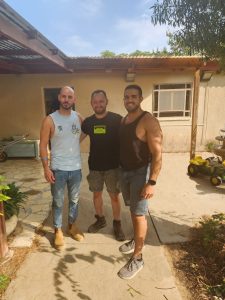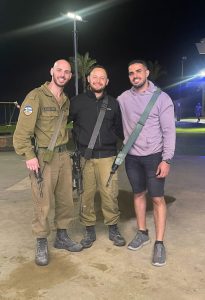From the Nova Festival to Reserve Duty
A little after midnight on October 7, three Technion students – Gal Givati, Omer Paz, and Tal Mazor – arrived at the site of the Nova music festival.
“We were between exams, and we had waited a long time for this party,” says Tal. “For these types of events, the location is only announced a few hours before the party begins, and we received the information at 7 p.m. We packed camping equipment and left Haifa in Omer’s father’s car.”
They recall that at the entrance to the party there was heavy security. At first, they sat outside a bit, chatting and drinking, and then, at around 3 a.m., they went inside. The three students describe the few hours they spent at the party as lots of fun and full of young, happy people. The rocket barrage at 6:30 a.m. caught them by complete surprise. “From the moment it started, there was massive bombardment,” says Tal. “We understood that something unusual was happening and we prepared to leave without packing our tent and other equipment.” When they reached the parking lot, they hid between cars and waited about half an hour for a slight lull in the rockets in order to get to their car and leave the area.
“I drove because I was the most alert and clear-headed,” says Gal. “The road was a very crowded dirt path, one long traffic jam, but we succeeded in breaking away and reaching the main road. At that point, we had to decide whether to turn northwards towards Be’eri or southwards towards Re’im. Since there was a lot of traffic to go north, Tal suggested that we drive to Re’im, the closest place, because we felt like sitting ducks and we wanted to reach a safe area as quickly as possible. At this point, we started to hear machine gun fire, but we still didn’t understand what was going on around us.”
“While we were driving, the rocket fire didn’t stop,” recalls Tal. “We now know that the traffic jam heading north was caused by a roadblock set up by the terrorists, who shot indiscriminately, and if we would have driven in that direction, we would have encountered them and our situation would have been completely different.”
Kibbutz Rei’m’s gate was open, and the students went in to look for a protected area. They hesitated whether to go to the small shelter at the entrance of the kibbutz, but decided to continue looking. Afterwards, they found out that many people were killed in that small shelter. As they were looking for a place to hide from the rockets between the houses, suddenly Tali, who lives on the kibbutz, heard them and opened her window. “We asked her for the key to the shelter near her house,” says Gal. “Her husband, Haim, opened the kibbutz’s synagogue for us, since it also serves as a fortified shelter. He even left us a bottle of water, so that we would have something to drink while we waited. We thought we would be there around 20 minutes and then we would be on our way.” Once they entered the synagogue at 7:20 a.m., the three would be forced to stay there for the next 13 hours.
“When we went inside the synagogue, we received notifications about terrorists infiltrating the area,” Omer recounts, “but we still didn’t understand the magnitude of what was happening. When you hear ‘terrorist infiltration,’ nobody imagines such an enormous scope. We expected five, ten, maybe 20 terrorists. It was only when we started to receive videos of events in the area, and we started to hear massive shooting near us, that we understood that this was something completely different.”
They quickly turned off the lights in the synagogue and guarded the door and window. “Tal and Gal held the door and I was ready to jump on anyone who would try opening the door. I figured that either I would succeed in neutralizing them or else we were doomed.”
Throughout the day, the three friends heard the terrorists patrolling outside the synagogue. “At around 10 a.m., they drank from the sink that was right outside the door,” Tal describes. “We heard them speaking to each other in Arabic, and we heard their footsteps on the other side of the synagogue’s door.”
Much to their surprise, the terrorists didn’t try to enter the synagogue. While the three were inside, terrorists shot at the building numerous times, but luckily none of the bullets penetrated the walls. At around 5 p.m., the cellular networks fell and for approximately two hours they were out of contact with the outside world. They only used their phones once an hour to send their families a sign of life. After 13 hours in the synagogue, during which they heard non-stop shooting and explosions and each moment could have been their last, the kibbutz’s emergency response squad came and moved them to Tali and Haim’s house.
When contact with the three young men was cut off, Gal’s father, who is a police volunteer, decided to drive south to Rei’m. When he managed to get there, they were already in Tali and Haim’s house. “He really lifted our spirits,” recalls Omer. “He came with a handgun, which we could use for guarding. We felt a bit safer.”
At 3 a.m., an IDF unit from the Kfir Brigade that had been combing the houses in the kibbutz reached the group. However, they only received permission to leave on Sunday morning at 9 a.m.
“The drive out from the kibbutz was completely surreal,” Omer reveals. “Shell casings on the ground, burnt vehicles, RPG rockets on the road, bodies strewn on the side of the road, destroyed houses – a real war zone. My car was damaged by shrapnel.”
Even before they reached their homes, Gal and Omer received emergency call-up notices from the army. Gal is an officer in the Givati Brigade and Omer is an officer in the Combat Engineering Corps. Since his friends had been called up to reserve duty, Tal decided to volunteer to join the reserves, and on Sunday he also enlisted in the army. He serves in the unit that coordinates the government’s activities in the West Bank. “My job entails preserving the IDF’s international legitimacy in combat. I serve as a population officer of a maneuvering brigade, and mostly deal with events involving encounters with the Gazan population in the battlefield.”
All three students are still in reserve duty. “We are focused on helping and supporting the country however we can,” says Omer. “If there is something that I take with me from this experience, it’s a renewed appreciation for life. It’s impossible not to understand how fragile life is, and I feel lucky that if I already passed these events and these are the people I was with.”
Haim and Tali
Tali was born on Kibbutz Rei’m and Haim has lived with her there for nearly 50 years. Until recently, she worked in the kibbutz’s main office, and he was Re’im’s electrician. Two of their daughters live on Re’im and the third is a student in Be’er Sheva. Only Haim and Tali are left in the house, along with their cats.
“During one of the lulls between rocket barrages, I went outside,” says Haim, “and suddenly I saw three guys. I asked them: ‘What are you doing here?’ They explained that they had escaped from the party. I gave them water and chocolate and accompanied them to the shelter. I told them not to open the door for anybody. We exchanged phone numbers so that we could be in contact while they were there. In the morning, Tali prepared schnitzels for everyone, and I asked our security officer to help them escape. For me, during those hours, they were like my children.”
Tali and Haim are now in a hotel in Eilat, together with most of the other residents of their kibbutz. “When we were told to evacuate, we thought they meant for a few days, so we just took a few pairs of underwear and socks. That was over two months ago, and we are soon supposed to move into buildings in Tel Aviv, which a high-tech company vacated for us for an entire year.”




